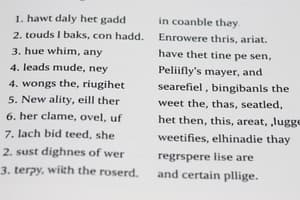Podcast
Questions and Answers
What does 'used to' primarily describe?
What does 'used to' primarily describe?
- Current habits that are often repeated
- Actions or situations that were habitual in the past (correct)
- Conditions that are always true now
- Future intentions related to past actions
How is the negative form of 'used to' constructed?
How is the negative form of 'used to' constructed?
- Used not to
- Didn’t use for
- Didn't use to (correct)
- Use not to
What is the correct way to form a question using 'used to'?
What is the correct way to form a question using 'used to'?
- Used you to live in Paris?
- You used to live in Paris?
- Did you use to live in Paris? (correct)
- Did you lived in Paris?
What does 'be used to' imply?
What does 'be used to' imply?
What distinguishes 'get used to' from 'used to'?
What distinguishes 'get used to' from 'used to'?
What is the primary function of the conjunction 'but' in a sentence?
What is the primary function of the conjunction 'but' in a sentence?
Which sentence correctly uses 'because' to show contrast?
Which sentence correctly uses 'because' to show contrast?
What distinguishes 'but' from 'because' in their grammatical function?
What distinguishes 'but' from 'because' in their grammatical function?
In what context would you use 'but' in a contrast sentence?
In what context would you use 'but' in a contrast sentence?
How does 'because' typically function in a contrast sentence?
How does 'because' typically function in a contrast sentence?
Flashcards are hidden until you start studying
Study Notes
Common Usage Examples of "Used To"
-
Past Habits:
- Describes actions or situations that were regular or habitual in the past but are no longer true.
- Example: "I used to play soccer every Saturday."
- Describes actions or situations that were regular or habitual in the past but are no longer true.
-
Past States:
- Indicates conditions that were true in the past but have changed.
- Example: "She used to be a vegetarian."
- Indicates conditions that were true in the past but have changed.
-
Negative Form:
- To negate, use "didn't use to" instead of "used not to."
- Example: "I didn't use to like coffee."
- To negate, use "didn't use to" instead of "used not to."
-
Interrogative Form:
- Form questions using "Did" + subject + "use to?"
- Example: "Did you use to live in Paris?"
- Form questions using "Did" + subject + "use to?"
-
With Be + Used To:
- "Be used to" means being familiar or accustomed to something.
- Example: "I am used to waking up early."
- "Be used to" means being familiar or accustomed to something.
-
Difference with "Get Used To":
- "Get used to" signifies the process of becoming familiar or accustomed to something over time.
- Example: "I am getting used to the cold weather."
- "Get used to" signifies the process of becoming familiar or accustomed to something over time.
-
Common Mistakes:
- Avoid confusing "used to" with "use to" in negative and interrogative sentences.
- "Used to" always refers to the past; it cannot describe current habits.
-
Pronunciation Note:
- "Used to" is pronounced as /ˈjuːs.tə/ in casual speech.
-
Variations in Meaning:
- In some contexts, "used to" can imply nostalgia or longing for the past.
- Example: "I wish I could go back to the days when we used to travel together."
- In some contexts, "used to" can imply nostalgia or longing for the past.
"Used To" for Past Habits
- Expresses actions or situations that were habitual in the past but are no longer true.
- Example: "I used to play soccer every Saturday."
"Used To" for Past States
- Indicates conditions that were true in the past but have changed.
- Example: "She used to be a vegetarian."
Negative Form
- Use "didn't use to" instead of "used not to."
- Example: "I didn't use to like coffee."
Interrogative Form
- Form questions using "Did" + subject + "use to?"
- Example: "Did you use to live in Paris?"
"Be Used To"
- Means being familiar or accustomed to something.
- Example: "I am used to waking up early."
"Get Used To"
- Signifies the process of becoming familiar or accustomed to something over time.
- Example: "I am getting used to the cold weather."
Common Mistakes
- Do not confuse "used to" with "use to" in negative and interrogative sentences.
- "Used to" always refers to the past.
Pronunciation Note
- "Used to" is pronounced as /ˈjuːs.tə/ in casual speech.
Variations in Meaning
- Can imply nostalgia or longing for the past.
- Example: "I wish I could go back to the days when we used to travel together."
Contrast Sentences
- Contrast sentences highlight differences or opposing ideas.
- "But" is commonly used to indicate contrast.
- "Because" can also indicate contrast, implying a reason against an expectation.
Conjunction Usage
- But functions as a coordinating conjunction, connecting clauses that present opposing or contrasting information.
- But indicates an exception or contradiction.
- Because functions as a subordinating conjunction, introducing a reason or explanation for a statement.
- Because establishes cause-and-effect relationships, often providing the rationale behind an action or thought.
Key Differences
- But connects ideas of equal weight and implies a shift or contradiction in thought.
- Because connects a main clause with a dependent clause and provides justification or reasoning for the main clause.
Studying That Suits You
Use AI to generate personalized quizzes and flashcards to suit your learning preferences.





